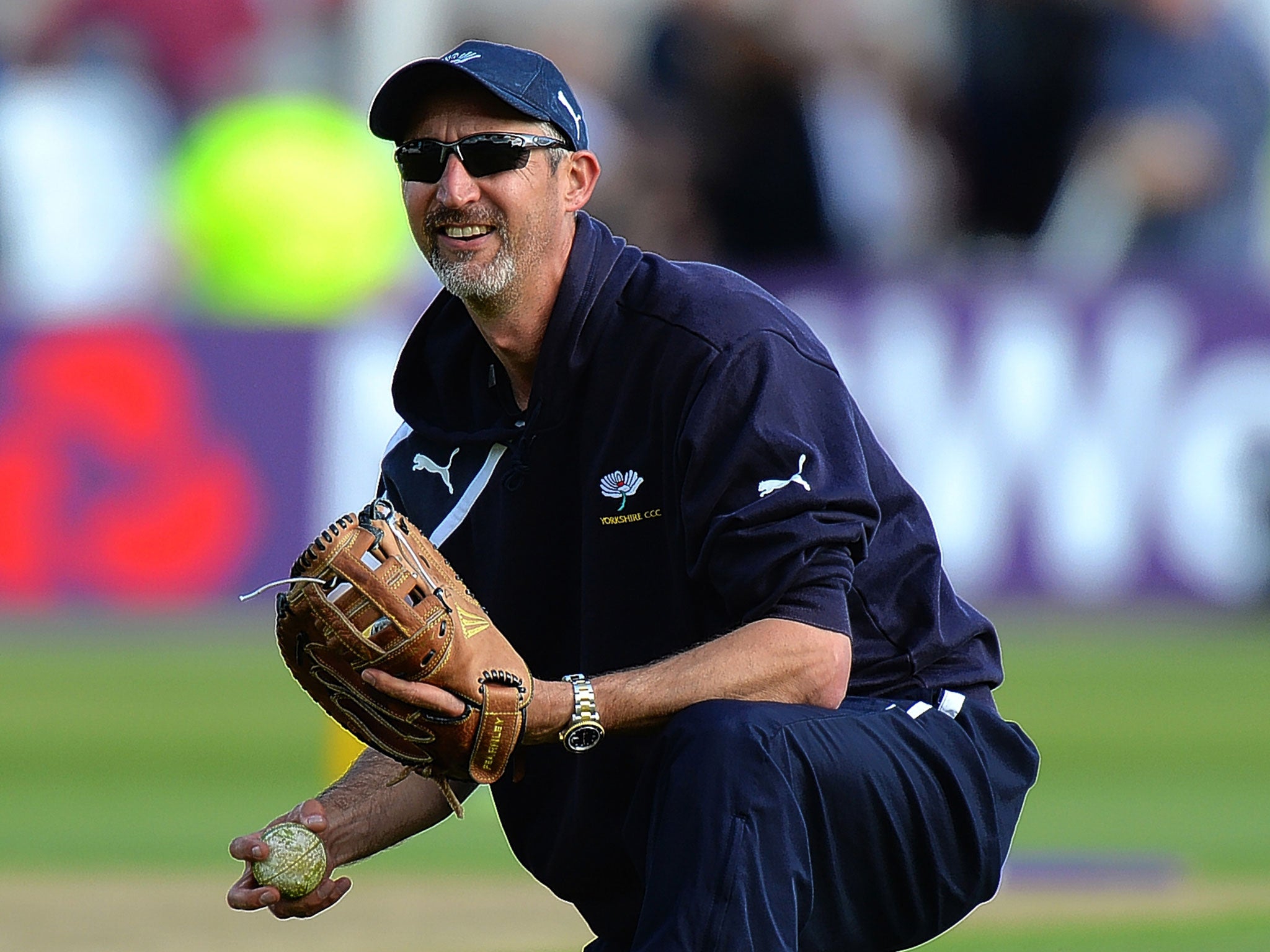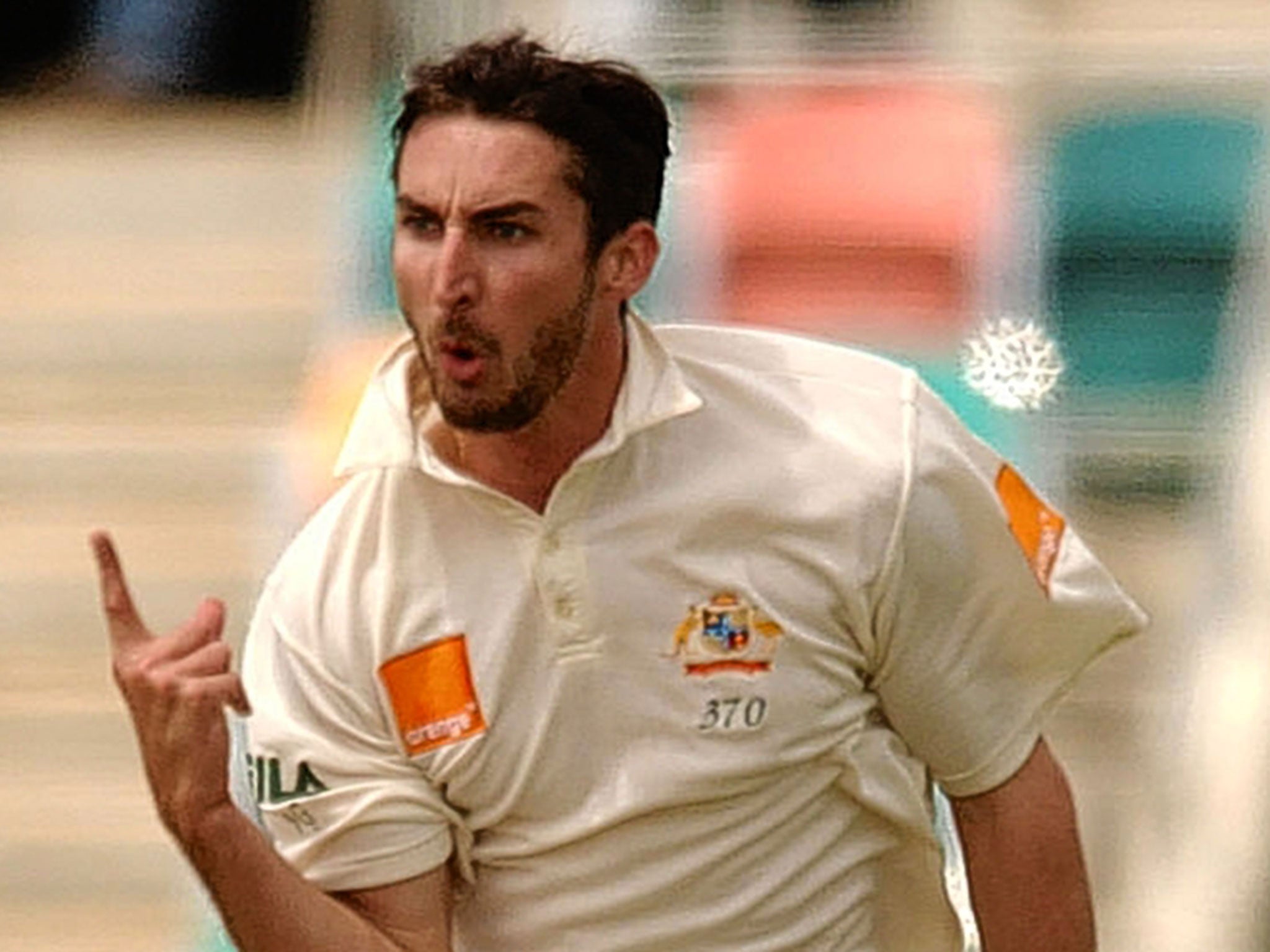Jason Gillespie: 'England? I've the greatest job in the world'
Gillespie holds no regrets at losing out to Trevor Bayliss as the new coach. He is settled in Yorkshire, and, as he tells Stephen Brenkley, can draw on his unconventional rise to appreciate what he has

Your support helps us to tell the story
From reproductive rights to climate change to Big Tech, The Independent is on the ground when the story is developing. Whether it's investigating the financials of Elon Musk's pro-Trump PAC or producing our latest documentary, 'The A Word', which shines a light on the American women fighting for reproductive rights, we know how important it is to parse out the facts from the messaging.
At such a critical moment in US history, we need reporters on the ground. Your donation allows us to keep sending journalists to speak to both sides of the story.
The Independent is trusted by Americans across the entire political spectrum. And unlike many other quality news outlets, we choose not to lock Americans out of our reporting and analysis with paywalls. We believe quality journalism should be available to everyone, paid for by those who can afford it.
Your support makes all the difference.Jason Gillespie is the coach England decided they did not want. All the smart money and most of the column inches were devoted to Gillespie. Yorkshire, where he has been coach for three years, were making succession plans. Then it was announced that he was not the preferred candidate.
If Gillespie was disappointed after all the attention, none of it sought, much of it deflected, it was matched by relief. While he believes that all people, not only sports coaches, should stretch themselves as far as they can, he is as happy as Larry at Yorkshire and has unfinished business there.
There were some doubts about taking the England job well before it was offered instead to his fellow Australian Trevor Bayliss, about whom Gillespie, typically, had only good things to say. Gillespie, perhaps bizarrely for a lad from Adelaide, has become part of the furniture in the Broad Acres.
Michael Vaughan, the former England captain, said the other day that when he thought of Gillespie he thought of him these days as a Yorkie (notwithstanding, presumably, the 394 international wickets he took for Australia, 259 of them in Test matches). One day, perhaps, his relaxed style of coaching will be examined in the international arena, but for now he is abundantly content to concentrate on continuing to help lead the great Yorkshire revival.
“I have the greatest job in the world,” he said. “I was sitting back in a chair in the viewing area at Headingley not long back, with a coffee and a grin on my face because I’m watching a young leg-spinner turning it square, tossing it up, getting wickets, bowlers steaming in.
“I’m just sitting there watching cricket and watching Yorkshire perform well. I just thought, ‘How lucky am I?’ I thought where else would I want to be, watching a genius at work. I just sat there and enjoyed it. I sat back and watched and it was brilliant. I jump out of bed every morning.”
The match was against Hampshire last month and the genius to whom he referred was Adil Rashid. It is not difficult to discern where Gillespie might lie in the debate over Rashid’s readiness for the England Test team.
Rashid is one of six Yorkshire players who were on England’s tour of the Caribbean this year. Cheekily but forlornly, the county asked for him to be sent back to bolster their Championship campaign when it was clear he was not going to feature in the series.
It is the loss of so many players to international duty that makes so marvellous Yorkshire’s triumph in the Championship last summer, their 32nd title, and their determined drive to retain it. At present they are second, the only unbeaten team, 11 points behind Durham (this is the true northern powerhouse) with a game in hand. Gillespie’s other task is to try to ensure that they start to perform more convincingly in the limited-overs competitions.
He arrived in Yorkshire as the surprising choice to remodel their coaching structure in 2011. While he had spent two happy seasons there as a player, it was an unexpected call. He was in the middle of Zimbabwe at the time in his first proper permanent coaching job.
“I had to start somewhere and I said if I’m going to be taken seriously I need to go and do some coaching,” Gillespie said. “I had coached the South Australian country side to last place, I had done some pieces but I hadn’t run a team really.
“It was a hand-to-mouth existence in Zimbabwe. I remember one day driving to training and it was payday for the team. I’m driving through the middle of Kwekwe, a little mining town and there were these queues about 150 metres long for the bank.
“As I drive slowly past it I see a few red shirts, about six of our players. They’re 100 metres back and training starts in 20 minutes. They want to get their money so they can take it home but they don’t know the bank is going to have money if they turn up after training.”
For six weeks, the Gillespies – he and wife Anna have four children under 10 – had no running water in their house. It turned out to be a small, easily repaired fault but they had to save what water they could when it was available. These were instructive experiences which have helped to inform his coaching life since.
The approach from Yorkshire came from their director of cricket, Martyn Moxon, with whom Gillespie had formed a close bond in his playing days at the county. Moxon saw him as the perfect fit.
It is fascinating to hear Gillespie talk of his coaching style, this lanky (very) fast bowler who, back in the day, wore his hair long, sported earrings and was part of one of the greatest of all teams. His first match at Headingley was in 1997 when he took 7 for 37 in England’s first innings. As he appeared diffidently, nervously at the post-match press conference, his words racing away barely before they had formed on his lips, it was impossible to imagine him in this job now.
“At the start, I was quite methodical and planned,” he said. “Because I was new to it all, I was very structured. It was all written down. I still do that now but with county cricket you know your routines, you don’t need to plan it out. I didn’t have all the answers, I certainly don’t have them now.”
As a coach, Gillespie’s main strength is as man manager, someone who can empathise with players. Some coaches pride themselves on their technical prowess. Gillespie is not one of them.
“That’s not a strong suit of mine at all. I look for some basics but I genuinely see myself as a manager, really. We have had a number of situations here at Yorkshire.
“Last year, for instance, we lost to Middlesex and Steve Patterson wasn’t himself. I said to Ian Dews, our academy coach, that something wasn’t quite right but I can’t pinpoint it. Now Dewsy has been watching Patto bowl since he was 15, he knows every intimate detail of his action. He had a look at the DVD and after 15 minutes came back out and said, ‘I’ve got it, I’ve got it.’ He was like a kid in a candy store.”

Patterson, one of the more unsung Yorkshire heroes, was jumping a fraction higher than normal at the crease, affecting his timings and length. It was rectified quickly. “For me, that’s what coaching is – work together as a team,” Gillespie said. “It doesn’t matter who comes up with it, get the lads back on track.
“I’ve developed a style just from doing it. I like to get to know the person. That will give me an insight into how I can work with him. If you have a bit of an idea what’s going on away from cricket that helps.
“I don’t want to know all the personal details but, if I know he’s a family man with two kids at home and his missus is pregnant, I have to take into account that maybe I just need to look after him and make sure training doesn’t drag on for him, whereas this other kid, single, lives just round the corner, is not doing anything tonight, he can hang around.
“It’s about the person and I learnt that in Zimbabwe. There was no better education for me in coaching than going there with the whole set-up there. Their biggest challenges are almost nothing to do with cricket and you learn that.”
Gillespie became part of a great Australia team almost by accident and certainly against the run of play. He remembers with absolute clarity the evening everything changed. He was 17 and playing third-grade cricket for Adelaide Cricket Club. He had had a growth spurt which caused injuries. One night he and some mates were sitting round talking about what they intended to do with their lives.
“Some of the lads said they were going to be a fireman and that sort of stuff. When I was asked what I was going to do, I said, ‘Well, I’m going to play Test cricket’. And they just all burst out laughing. They started to call me the Lion of Adelaide and just absolutely taking the mickey out of me. It hit me a like a bolt of lightning. I had always had this in my mind that I was going to play cricket for Australia but no one else could see it.”
What happened next changed everything. Gillespie went to a net, measured a run-up and bowled as fast as he could (“I had the shits”). For 40 minutes he steamed in. The club’s A-grade captain happened to be passing. The rest is history. Within two years he was playing for South Australia, within four for Australia and weeks after that became “Dizzy” to anyone in cricket.
He bowled fast, he was a perfect complement to Glenn McGrath (“a great bowler, a great friend and the most confident man I’ve ever met”) and had an auspicious career. He remains a little irritated with himself about how it ended.
“I look back at the last couple of years of my career and I realise that I was just about done because I didn’t want to do the extra which I had always done.
“I had a poor Ashes tour in 2005, I came back, took 40-odd wickets for South Australia, bowled well and then got picked for a tour of Bangladesh. There were injuries, I got eight wickets in a two-match series, which in those conditions was good. I bowled well but I knew somehow it was my last match.”
More famously, of course, that last match in Chittagong featured Gillespie making 201 not out after going in as nightwatchman. It was unprecedented and if he had to go out it was some way to do it.
He played on – Yorkshire, Glamorgan, the ill-fated Indian Cricket League – before he found coaching and coaching found him. And now here he is, an honorary Yorkshireman leading the greatest of all clubs. England might have found the right man in Bayliss. They certainly would not have had the wrong one in Gillespie.
Join our commenting forum
Join thought-provoking conversations, follow other Independent readers and see their replies
Comments